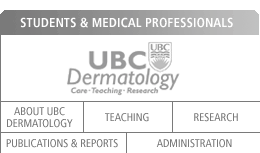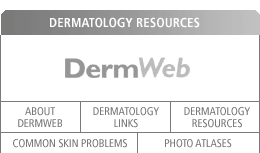Frequently Asked Questions
Laser Skin Resurfacing
How do I know if laser skin resurfacing is for me?
- The best way to determine if laser skin resurfacing is best for you is to meet with a doctor who is trained in the use of lasers and practices this style of treatment on a regular basis. Contact the centre at 604-875-4682 to schedule a consultation. There is a consultation fee for all medical services and conditions not covered by the Medical Services Plan of BC. For laser services, the consultation fee is applied to the cost of the procedure if the patient undergoes the procedure within 6 months.
- Make a list of questions and take it along with you for your first consultation. It is extremely important that you understand the procedure and know what to expect both during and after the treatment. Don't be afraid to talk with the doctor about your concerns and expectations. Together, you can decide if laser skin resurfacing is the right choice for you.
How painful are the treatments?
- To prevent discomfort during treatment we offer a range of options from local to regional to general anaesthetic.
- Patients undergoing laser resurfacing generally require the treatment area to be frozen with a local or regional nerve-block procedure. Once the freezing takes effect, discomfort is minimal.
- For larger areas, a general anesthetic may be used.
How much will it hurt after the treatment?
- The pain varies depending on the treatment and treatment area, but is usually minimal. Tylenol may be used for post-treatment discomfort but this is not always necessary.
Will there be any scarring?
- Scarring is uncommon, however a slight risk of side effects accompanies any skin treatment procedure. Most side effects are reversible with time. Some skin types are more prone to side effects than others. This will be discussed during the consultation.
|
How many treatments are required?
- For laser skin resurfacing, usually only one treatment is required. Depending on size of treatment area and your skin type, the treatment can last between 30 minutes to two hours.
How long will it be before I see the full benefit of my treatment?
- Initially your treated skin will be red, then gradually fade to pink, and eventually return to your normal skin colour. What you see initially following treatment is not the final result since the treated area continues to tighten and improve with time. You will continue to see improvement up to six months or even more following treatment.
To schedule a consultation please call us at 604-875-4682.
Tissue Implants
What is Collagen?
- Collagen is part of the natural support structure of your skin. Wrinkles form when this natural collagen thins. Collagen treatments replenish the skin's collagen layer, smoothing lines and wrinkles, and adding definition to the lip.
- The substitute collagen is extracted from cows raised exclusively for this purpose. It is combined with a trace dose of anesthetic to dull local discomfort during the procedure and is recognized under the trade names such as Artecoll®, Zyderm®, and Zyplast®
- Artecoll is collagen with an added ingredient - tiny microspheres that extend the longevity of the treatment.
- During your consultation details on each product will be discussed to your satisfaction.
What is Hyaluronic Acid?
- Similar to Collagen, it is a naturally occurring substance. Babies have an abundance of Hyaluronic Acid in their system, which makes their skin especially plump.
- The Hyaluronic Acid we administer is synthetically produced. It differs from collagen because the composition is a large molecule that is very hydroscopic, meaning it absorbs water. It is this absorption that provides the results. Also, the body it is much less sensitive to Hyaluronic Acid and few patients experience a reaction to the treatment.
Do collagen injections hurt?
- Patients typically describe the procedure as no more noticeable than a pinprick.
|
What is the Collagen procedure?
- A pretreatment test is given four weeks before the procedure to test for any potential sensitivity to the collagen. (With hyaluronic acid there is no pretest required.)
- If there is no reaction, minute droplets of the implant material are injected with a fine needle just below the skin's surface where it will mesh with the existing tissue and plump up lines, wrinkles and skin defects.
What is the Hyaluronic Acid procedure?
- Minute droplets of the implant material are injected with a fine needle just below the skin's surface where it will mesh with the existing tissue and plump up lines, wrinkles and skin defects.
What happens after the treatment?
- Following the injection, the sites will look pink and there will be a swollen area that could last a few hours much like a mosquito bite.
- On rare occasions, there is bruising that may take two or three days to subside.
- Cover make-up can be applied after the treatment.
- After a few weeks as the implant material is incorporated into the tissue it will respond and feel like normal tissue.
Are there any side effects?
- Among the many thousands who have had tissue implant injections, less than 1% of patients have reported adverse reactions.
- The precautions we take, including eliciting a patient history and testing for allergy, reduce the likelihood of side effects.
How many sessions will I need?
- Depending on your expectations, the degree of correction and the area to be treated, several sessions may be required. It must be understood that the results from collagen and filler implants are not permanent. Touch-up treatments are needed within six to 12 months after the original procedure. This is especially recommended in areas such as expression lines where the face is more mobile.
What results can I expect from collagen or filler treatments?
- You will notice considerable improvement in facial lines following the first session, however no implant will be completely effective on scars with distinctive edges or the "ice-pack" scars associated with acne.
- During the initial consultation, we will clearly describe the results you can expect.
- We also have a library of before-and-after photos to assist you in developing realistic expectations of the treatment.
Am I a good candidate for collagen or filler implants?
- A well-informed person is the best candidate. Most skin imperfections respond well to the treatments; but there are some that respond poorly. Expectations, limitations, and outcomes will be addressed during your consultation.
|
|

